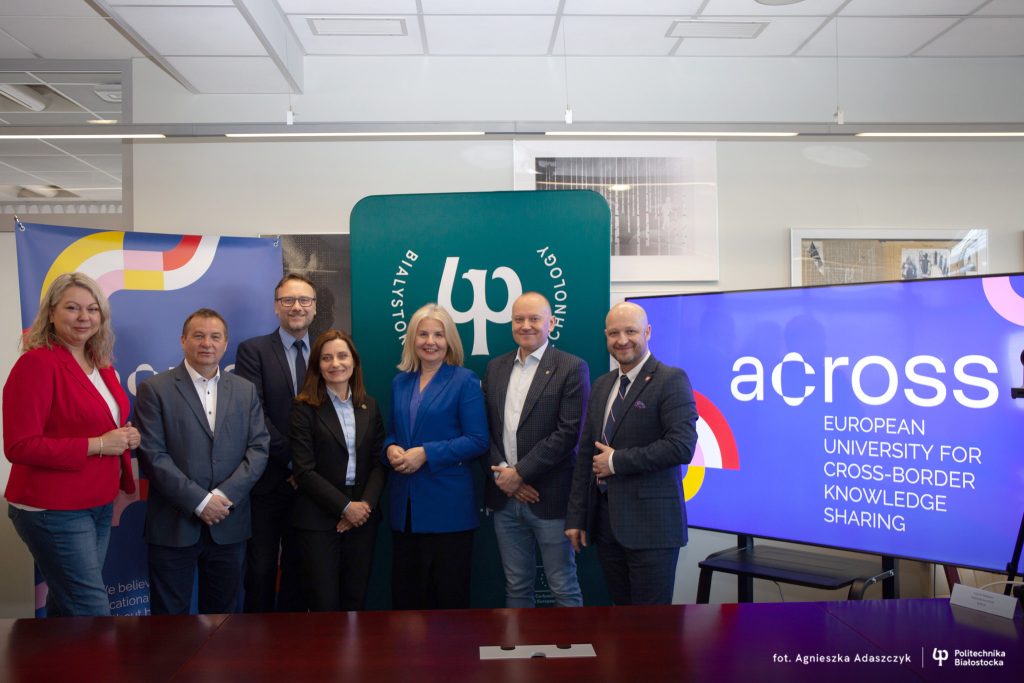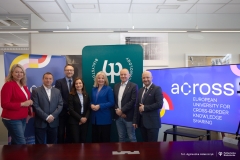
The event was organised by the coordinator of the ACROSS project at Bialystok University of Technology, who, along with representatives of other new alliances that launched their projects in 2025, recognised the need for exchanging experiences among universities at different stages of implementing European Universities programmes.
– The aim of the meeting is to exchange experiences with project coordinators who have been implementing these initiatives in Poland for several years now. We are here to adopt best practices from more experienced universities, avoid mistakes, and better prepare for the implementation of our projects – emphasized Assoc. Prof. Dorota Krawczyk, DSc, PhD, Eng, vice-rector for international cooperation at Bialystok University of Technology and coordinator of the ACROSS project.
The meeting brought together representatives of universities involved in various alliances, including ACROSS, ChallengeEU, UniGreen, COLOURS, KreativEU and EU4DUAL. Each of these projects focuses on developing international cooperation, academic mobility and innovative educational methods.
The role of Bialystok University of Technology and the ACROSS project
Bialystok University of Technology is part of the ACROSS alliance, which brings together universities from nine countries.
– This is a long-term initiative aimed at building a lasting consortium. The benefits are multidimensional – for scientists, didactics and students, because it is primarily for them that we create these opportunities – noted Assoc. Prof. Dorota Anna Krawczyk, DSc, PhD, Eng.
Voice of experts and project leaders
Katarzyna Aleksy, Director of the Higher Education Programmes Office of the National Agency of the Erasmus+ Programme, plays an advisory and monitoring role in the implementation of European Universities in Poland.
– On Thursday in Brussels, a meeting of European Universities stakeholders will take place, where we will begin negotiations on their role and significance in the new financial perspective – announced Director Aleksy.
Challenges and opportunities for universities
One of the discussion topics was the administrative and legal barriers that may hinder cooperation within international alliances.
– We know that this type of initiative, which brings together eleven large institutions, will involve procedural and bureaucratic challenges. However, I hope that simplified solutions at the European Union level will help us efficiently implement our activities – emphasised Assoc. Prof. Aneta Kucińska-Landwójtowicz, PhD, Eng, vice-rector for cooperation at Opole University of Technology, participating in the KreativEU alliance.
Her university, which recently joined the European Universities programme, focuses on implementing innovative teaching methods and strengthening collaboration with universities of a similar profile.
– As Opole University of Technology, we have recognised that now is the time to seek innovation in teaching, engage in international cooperation, and combine our potential with other medium-sized universities – added Prof. Kucińska-Landwójtowicz.
International cooperation in practice
Prof. Paweł Wielgosz, Dsc, PhD, Eng, Plenipotentiary of the Rector of the University of Warmia and Mazury for European University, emphasised that his university’s goal within the ChallengeEU alliance is to develop academic cooperation.
– The biggest challenge is to engage students. Will they actually want to participate in mobility and joint projects with our partners? This is a key question for the future – Prof. Wielgosz pointed out.
Assoc. Prof. Paweł Śniatała, Dsc, PhD, Eng, an expert in international cooperation from Poznan University of Technology, spoke about the role of European Universities in enhancing the quality of scientific research.
– The greatest added value is the expansion of the academic family – in our case by ten European universities. This strengthens our position on the international stage – stated Prof. Śniatała.
Assoc. Prof. Marcin Sosnowski, Dsc, PhD, Eng, vice-rector of the Jan Długosz University in Częstochowa, who coordinates the COLOURS alliance, highlighted the crucial role of academic staff.
– The most important aspect is the staff. The creativity of employees is key, as they are the ones who drive these initiatives and ensure that students and doctoral students benefit as much as possible from these programmes.
Assoc. Prof. Karol Chrobak, Dsc, PhD, the coordinator of the UniGreen project, stressed that the success of European Universities ultimately depends on people.
– The alliance develops based on two fundamental values: people and communication. These determine the success of the projects, which is why we strive to build strong teams and learn from those who have been in these programmes longer.
The meeting at Bialystok University of Technology demonstrated that European University alliances are the future of higher education. International cooperation, student and researcher mobility, and the integration of educational systems are priorities that Polish universities aim to achieve within the framework of European Universities.

by aj








